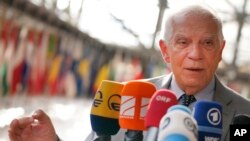The European Union on Monday slapped new sanctions on Iran for its crackdown on anti-government protesters and launched a mission to train 15,000 Ukrainian soldiers in member states.
European foreign ministers meeting in Brussels on Monday imposed travel bans and asset freezes on 29 Iranians, including high-ranking members of the country's Revolutionary Guard and Interior Minister Ahmad Vahidi.
Four Iranian organizations are also targeted, as the EU hardens its response to Tehran's crackdown on a massive protest movement that erupted following the September death of a young woman in Iranian police custody. On Monday, Iran issued its first death sentence against a protester.
Also in the EU's sanctions crosshairs: attack drones Iran supplied to Russia for its war on Ukraine. EU foreign policy chief Josep Borrell demanded Iran stop providing Moscow with military aid — which reports suggest might also include ballistic missiles — and said the bloc would take further steps, if needed.
"The drones provided by Iran to Russia allegedly a month ago," Borrell said, "Are being used in that war, and it's a clear violation of the United Nations Security Council Resolution 2231."
The EU is discussing a ninth sanctions package against Moscow. More immediately, it will begin training thousands of Ukrainian troops in various member states, including Poland, Spain and France.
Borrell said Europe had so far provided Ukraine with about $8 billion worth of military equipment — or roughly 45 percent of what Washington has furnished.
He added that "We will continue isolating Russia internationally. We will continue imposing restrictive measures against the Russian economy. We stand ready to continue enforcing restrictive measures and target third countries involved, especially the ones … that are providing arms and military support [to Russia]."
Countering speculation that Europe might pressure Kyiv to enter peace talks, Borrell said it will be up to Ukraine to decide if and when to start talks with Russia, and that "We will continue supporting Ukraine until Ukraine's victory — and it has to be understood, on the Ukrainian parameters."
The war in Ukraine has sparked a massive refugee influx to the EU, along with soaring prices and an energy crunch.







